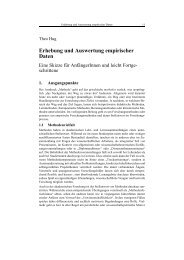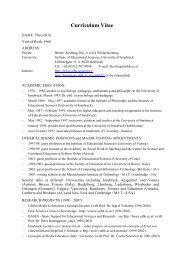Cultures and Ethics of Sharing - Universität Innsbruck
Cultures and Ethics of Sharing - Universität Innsbruck
Cultures and Ethics of Sharing - Universität Innsbruck
- Keine Tags gefunden...
Sie wollen auch ein ePaper? Erhöhen Sie die Reichweite Ihrer Titel.
YUMPU macht aus Druck-PDFs automatisch weboptimierte ePaper, die Google liebt.
Privacy on Social Networking Sites within a Culture <strong>of</strong> Exchange 97based on the targeted advertising business model, which means that it engages in exchangecontracts with the advertising industry. It sells data, which is produced while people usethe site for different reasons, such as getting news, providing information, staying in touchwith friends, making new relations, or organising events, to advertisers. Facebook’s businessmodel is based on secondary use <strong>of</strong> this data for commodification <strong>and</strong> valorisationpurposes (see Dallas Smythe, 1989; Fuchs, 2011a). Whereas traditional forms <strong>of</strong> advertisingare directed to broad groups <strong>of</strong> potential buyers, targeted advertising is tailored forexactly defined <strong>and</strong> differentiated groups, or even single consumers. This dem<strong>and</strong>s moredetailed, exact, <strong>and</strong> differentiated knowledge <strong>of</strong> the users’ needs <strong>and</strong> (buying) behaviour.The economic reason why pr<strong>of</strong>it-oriented SNS develop massive systems <strong>of</strong> surveillance<strong>and</strong> store “literally everything”, as a Facebook employee admitted (see Wong, 2010), liestherein. Users’ interests in privacy can only be considered when the need for privacy doesnot inhibit pr<strong>of</strong>it interests.One can conclude that SNS’s surveillance based business model, which has its reason inthe pr<strong>of</strong>it-orientation, can cause a privacy crisis. Facebook changes its terms <strong>of</strong> use <strong>and</strong>privacy policy steadily, thereby ever more personal data becomes available publicly toever more people by its default privacy settings (see McKeon, 2010). These processeshave resulted in public outcry. An example <strong>of</strong> such outcry are several complaints againstFacebook, like the complaints by the Electronic Privacy Information Center (EPIC) addressedto the US Federal Trade Commission (see Epic et al., 2009; 2010), the complaintsby Austrian students addressed to the Irish Data Protection Commissioner (see Europeversus Facebook 2011), or the investigation by the Nordic data inspection agencies (seeDatatilsynet, 2011). Our political economy analysis <strong>of</strong> privacy on Facebook shows thatevoking privacy crisis lies in the nature <strong>of</strong> pr<strong>of</strong>it-oriented SNS.It seems that privacy is the opponent term to surveillance. Surveillance, which takes placeon SNS out <strong>of</strong> economic reasons, <strong>and</strong> privacy contradict each other. However, some lucidauthors have made different observations. For instance, Nock says that “a society <strong>of</strong>strangers is one <strong>of</strong> immense personal privacy. Surveillance is the cost <strong>of</strong> that privacy”(Nock, 1993, p. 1). Lyon agrees that “in our nomadic world the society <strong>of</strong> strangers seeksprivacy that actually gives rise to surveillance” (Lyon, 2005, p. 27). Some draw consequencesfrom these observations <strong>and</strong> argue that referring to privacy cannot be the appropriateway to challenge surveillance (see Stalder, 2002). Critical dialectical theory remindsus that “the conception <strong>of</strong> the contradictory nature <strong>of</strong> societal reality does not, however,sabotage knowledge <strong>of</strong> it <strong>and</strong> expose it to the merely fortuitous. Such knowledge is guaranteedby the possibility <strong>of</strong> grasping the contradiction as necessary <strong>and</strong> thus extendingrationality to it” (Adorno, 1976, p. 109). On behalf <strong>of</strong> our political economy analysis <strong>of</strong>the culture <strong>of</strong> exchange, we are able to do exactly what critical dialectical theory proposes.In figure 1, the nexus <strong>of</strong> privacy, private property, <strong>and</strong> surveillance within a culture <strong>of</strong> exchangeis presented.








